Professional Roles and Values
VerifiedAdded on 2023/04/21
|7
|1699
|410
AI Summary
This article discusses the importance of communication in patient-centered care and the ethical considerations in nursing profession. It explores the principles of autonomy, beneficence, non-maleficence, and justice in healthcare. The case study of Mr. Newcomb, who has been diagnosed with stage 4 pancreatic cancer, is used to illustrate these concepts.
Contribute Materials
Your contribution can guide someone’s learning journey. Share your
documents today.
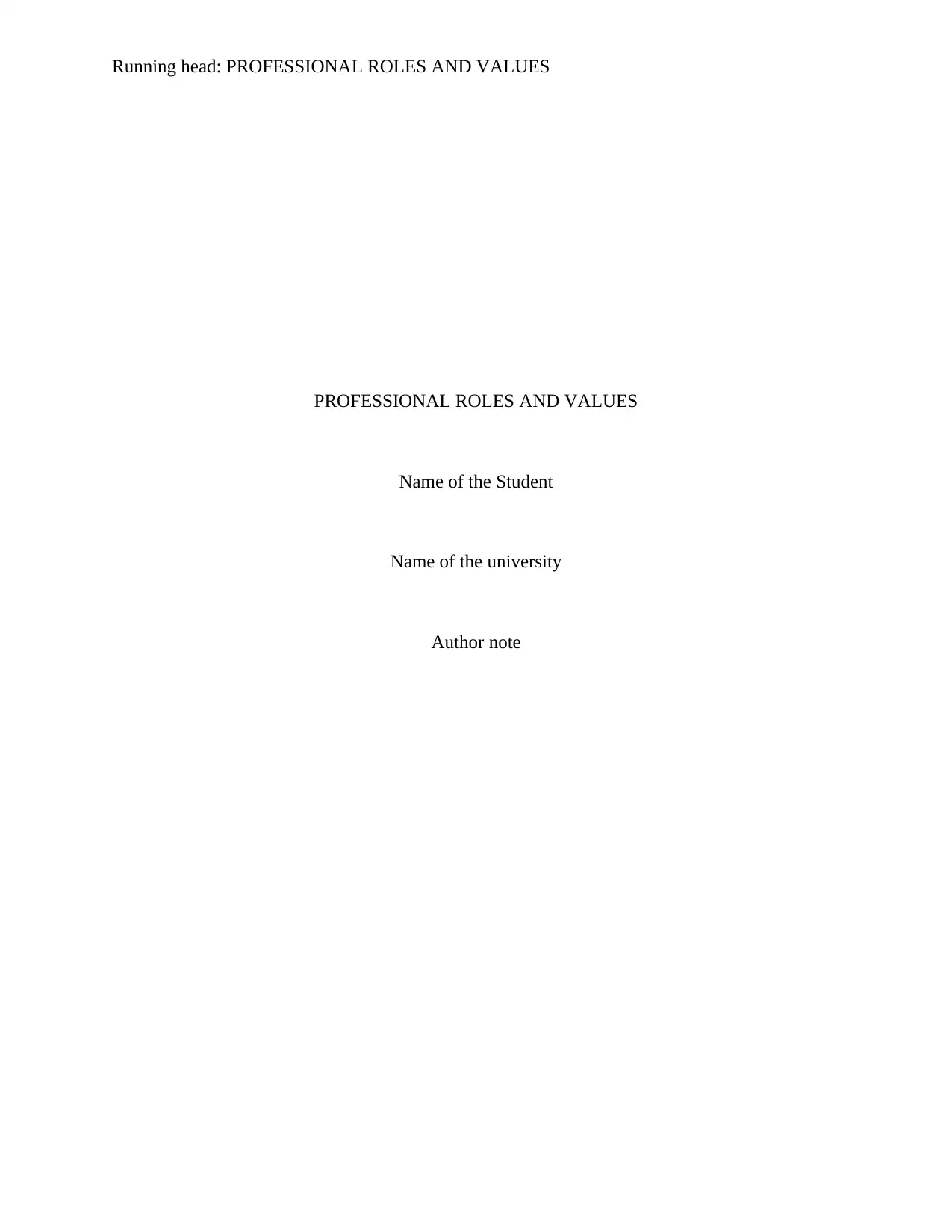
Running head: PROFESSIONAL ROLES AND VALUES
PROFESSIONAL ROLES AND VALUES
Name of the Student
Name of the university
Author note
PROFESSIONAL ROLES AND VALUES
Name of the Student
Name of the university
Author note
Secure Best Marks with AI Grader
Need help grading? Try our AI Grader for instant feedback on your assignments.
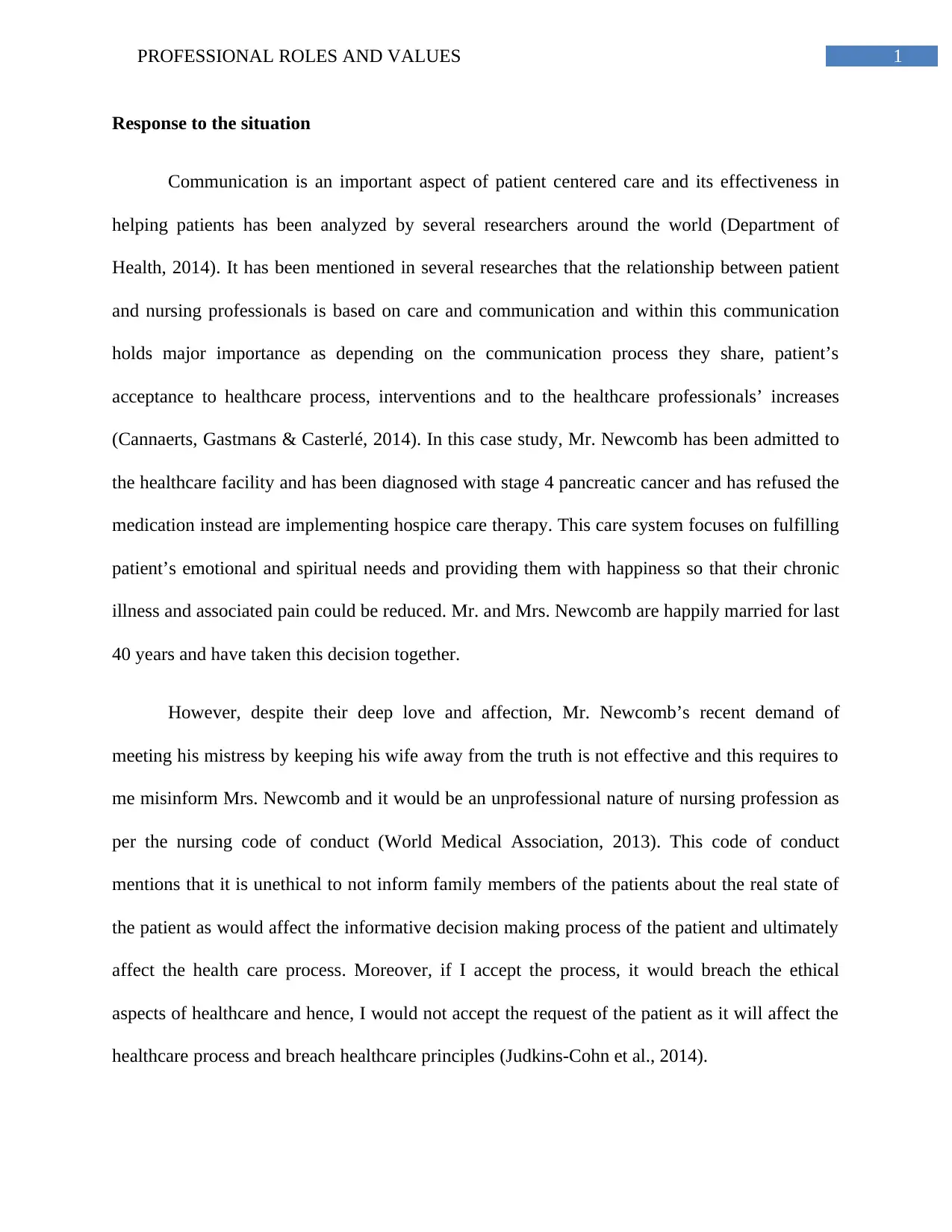
1PROFESSIONAL ROLES AND VALUES
Response to the situation
Communication is an important aspect of patient centered care and its effectiveness in
helping patients has been analyzed by several researchers around the world (Department of
Health, 2014). It has been mentioned in several researches that the relationship between patient
and nursing professionals is based on care and communication and within this communication
holds major importance as depending on the communication process they share, patient’s
acceptance to healthcare process, interventions and to the healthcare professionals’ increases
(Cannaerts, Gastmans & Casterlé, 2014). In this case study, Mr. Newcomb has been admitted to
the healthcare facility and has been diagnosed with stage 4 pancreatic cancer and has refused the
medication instead are implementing hospice care therapy. This care system focuses on fulfilling
patient’s emotional and spiritual needs and providing them with happiness so that their chronic
illness and associated pain could be reduced. Mr. and Mrs. Newcomb are happily married for last
40 years and have taken this decision together.
However, despite their deep love and affection, Mr. Newcomb’s recent demand of
meeting his mistress by keeping his wife away from the truth is not effective and this requires to
me misinform Mrs. Newcomb and it would be an unprofessional nature of nursing profession as
per the nursing code of conduct (World Medical Association, 2013). This code of conduct
mentions that it is unethical to not inform family members of the patients about the real state of
the patient as would affect the informative decision making process of the patient and ultimately
affect the health care process. Moreover, if I accept the process, it would breach the ethical
aspects of healthcare and hence, I would not accept the request of the patient as it will affect the
healthcare process and breach healthcare principles (Judkins-Cohn et al., 2014).
Response to the situation
Communication is an important aspect of patient centered care and its effectiveness in
helping patients has been analyzed by several researchers around the world (Department of
Health, 2014). It has been mentioned in several researches that the relationship between patient
and nursing professionals is based on care and communication and within this communication
holds major importance as depending on the communication process they share, patient’s
acceptance to healthcare process, interventions and to the healthcare professionals’ increases
(Cannaerts, Gastmans & Casterlé, 2014). In this case study, Mr. Newcomb has been admitted to
the healthcare facility and has been diagnosed with stage 4 pancreatic cancer and has refused the
medication instead are implementing hospice care therapy. This care system focuses on fulfilling
patient’s emotional and spiritual needs and providing them with happiness so that their chronic
illness and associated pain could be reduced. Mr. and Mrs. Newcomb are happily married for last
40 years and have taken this decision together.
However, despite their deep love and affection, Mr. Newcomb’s recent demand of
meeting his mistress by keeping his wife away from the truth is not effective and this requires to
me misinform Mrs. Newcomb and it would be an unprofessional nature of nursing profession as
per the nursing code of conduct (World Medical Association, 2013). This code of conduct
mentions that it is unethical to not inform family members of the patients about the real state of
the patient as would affect the informative decision making process of the patient and ultimately
affect the health care process. Moreover, if I accept the process, it would breach the ethical
aspects of healthcare and hence, I would not accept the request of the patient as it will affect the
healthcare process and breach healthcare principles (Judkins-Cohn et al., 2014).
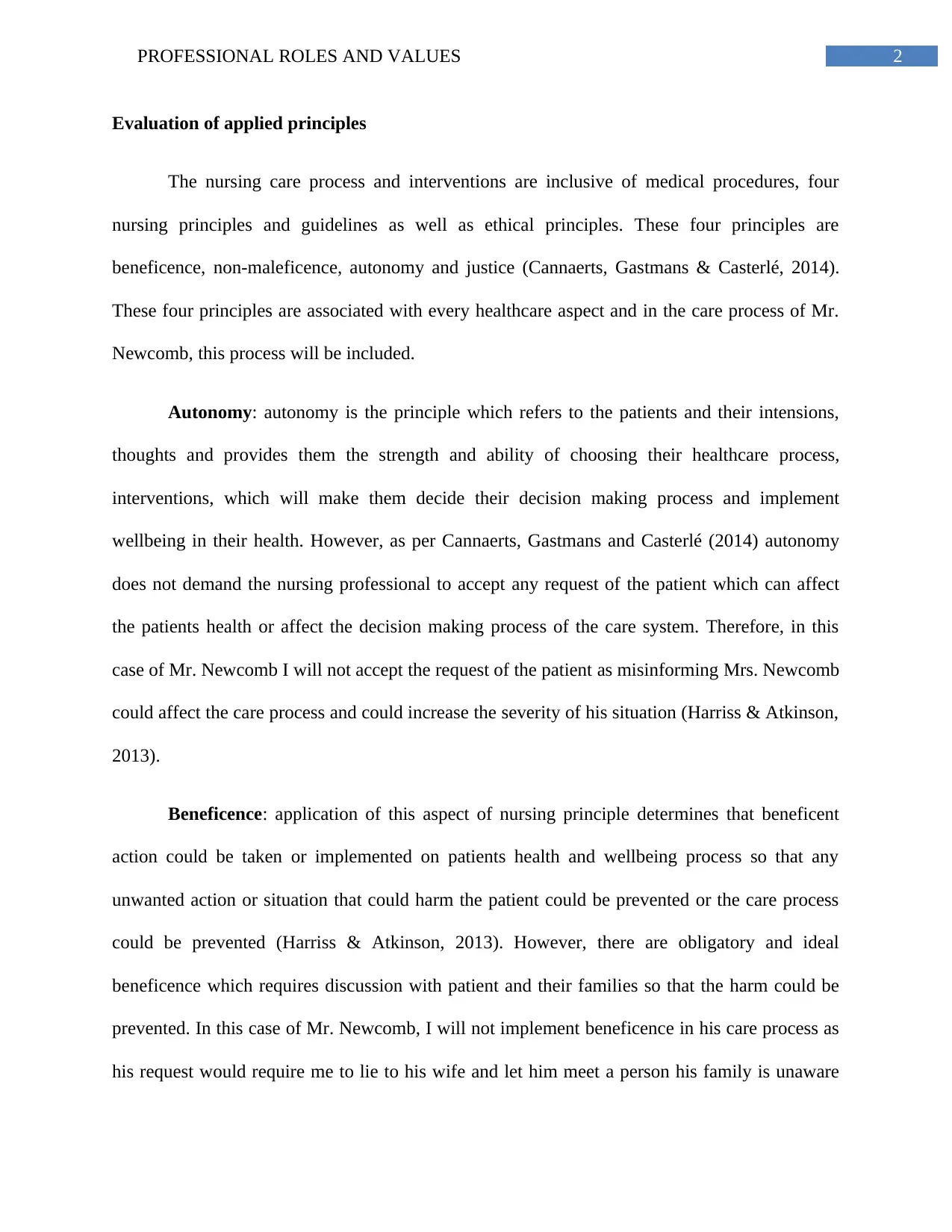
2PROFESSIONAL ROLES AND VALUES
Evaluation of applied principles
The nursing care process and interventions are inclusive of medical procedures, four
nursing principles and guidelines as well as ethical principles. These four principles are
beneficence, non-maleficence, autonomy and justice (Cannaerts, Gastmans & Casterlé, 2014).
These four principles are associated with every healthcare aspect and in the care process of Mr.
Newcomb, this process will be included.
Autonomy: autonomy is the principle which refers to the patients and their intensions,
thoughts and provides them the strength and ability of choosing their healthcare process,
interventions, which will make them decide their decision making process and implement
wellbeing in their health. However, as per Cannaerts, Gastmans and Casterlé (2014) autonomy
does not demand the nursing professional to accept any request of the patient which can affect
the patients health or affect the decision making process of the care system. Therefore, in this
case of Mr. Newcomb I will not accept the request of the patient as misinforming Mrs. Newcomb
could affect the care process and could increase the severity of his situation (Harriss & Atkinson,
2013).
Beneficence: application of this aspect of nursing principle determines that beneficent
action could be taken or implemented on patients health and wellbeing process so that any
unwanted action or situation that could harm the patient could be prevented or the care process
could be prevented (Harriss & Atkinson, 2013). However, there are obligatory and ideal
beneficence which requires discussion with patient and their families so that the harm could be
prevented. In this case of Mr. Newcomb, I will not implement beneficence in his care process as
his request would require me to lie to his wife and let him meet a person his family is unaware
Evaluation of applied principles
The nursing care process and interventions are inclusive of medical procedures, four
nursing principles and guidelines as well as ethical principles. These four principles are
beneficence, non-maleficence, autonomy and justice (Cannaerts, Gastmans & Casterlé, 2014).
These four principles are associated with every healthcare aspect and in the care process of Mr.
Newcomb, this process will be included.
Autonomy: autonomy is the principle which refers to the patients and their intensions,
thoughts and provides them the strength and ability of choosing their healthcare process,
interventions, which will make them decide their decision making process and implement
wellbeing in their health. However, as per Cannaerts, Gastmans and Casterlé (2014) autonomy
does not demand the nursing professional to accept any request of the patient which can affect
the patients health or affect the decision making process of the care system. Therefore, in this
case of Mr. Newcomb I will not accept the request of the patient as misinforming Mrs. Newcomb
could affect the care process and could increase the severity of his situation (Harriss & Atkinson,
2013).
Beneficence: application of this aspect of nursing principle determines that beneficent
action could be taken or implemented on patients health and wellbeing process so that any
unwanted action or situation that could harm the patient could be prevented or the care process
could be prevented (Harriss & Atkinson, 2013). However, there are obligatory and ideal
beneficence which requires discussion with patient and their families so that the harm could be
prevented. In this case of Mr. Newcomb, I will not implement beneficence in his care process as
his request would require me to lie to his wife and let him meet a person his family is unaware
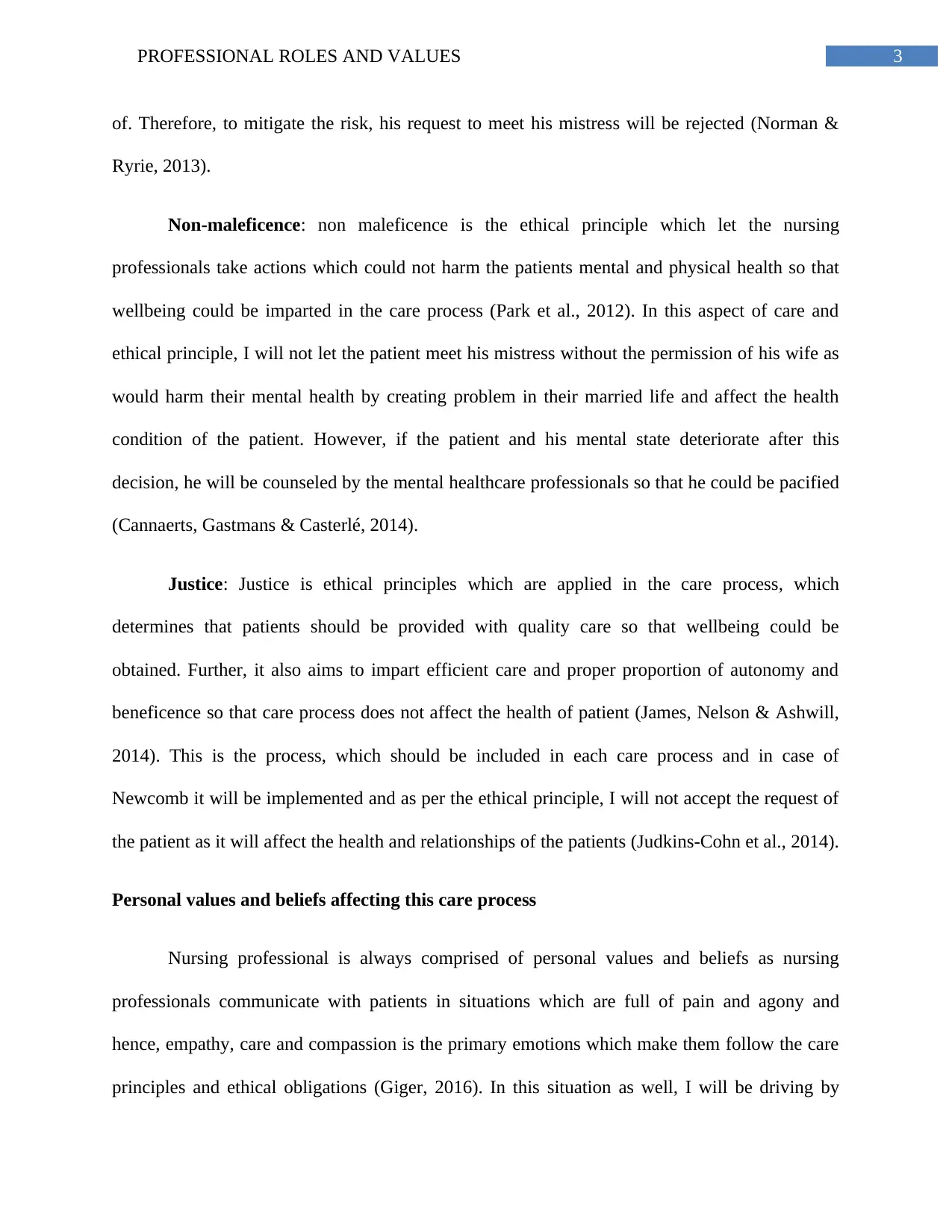
3PROFESSIONAL ROLES AND VALUES
of. Therefore, to mitigate the risk, his request to meet his mistress will be rejected (Norman &
Ryrie, 2013).
Non-maleficence: non maleficence is the ethical principle which let the nursing
professionals take actions which could not harm the patients mental and physical health so that
wellbeing could be imparted in the care process (Park et al., 2012). In this aspect of care and
ethical principle, I will not let the patient meet his mistress without the permission of his wife as
would harm their mental health by creating problem in their married life and affect the health
condition of the patient. However, if the patient and his mental state deteriorate after this
decision, he will be counseled by the mental healthcare professionals so that he could be pacified
(Cannaerts, Gastmans & Casterlé, 2014).
Justice: Justice is ethical principles which are applied in the care process, which
determines that patients should be provided with quality care so that wellbeing could be
obtained. Further, it also aims to impart efficient care and proper proportion of autonomy and
beneficence so that care process does not affect the health of patient (James, Nelson & Ashwill,
2014). This is the process, which should be included in each care process and in case of
Newcomb it will be implemented and as per the ethical principle, I will not accept the request of
the patient as it will affect the health and relationships of the patients (Judkins-Cohn et al., 2014).
Personal values and beliefs affecting this care process
Nursing professional is always comprised of personal values and beliefs as nursing
professionals communicate with patients in situations which are full of pain and agony and
hence, empathy, care and compassion is the primary emotions which make them follow the care
principles and ethical obligations (Giger, 2016). In this situation as well, I will be driving by
of. Therefore, to mitigate the risk, his request to meet his mistress will be rejected (Norman &
Ryrie, 2013).
Non-maleficence: non maleficence is the ethical principle which let the nursing
professionals take actions which could not harm the patients mental and physical health so that
wellbeing could be imparted in the care process (Park et al., 2012). In this aspect of care and
ethical principle, I will not let the patient meet his mistress without the permission of his wife as
would harm their mental health by creating problem in their married life and affect the health
condition of the patient. However, if the patient and his mental state deteriorate after this
decision, he will be counseled by the mental healthcare professionals so that he could be pacified
(Cannaerts, Gastmans & Casterlé, 2014).
Justice: Justice is ethical principles which are applied in the care process, which
determines that patients should be provided with quality care so that wellbeing could be
obtained. Further, it also aims to impart efficient care and proper proportion of autonomy and
beneficence so that care process does not affect the health of patient (James, Nelson & Ashwill,
2014). This is the process, which should be included in each care process and in case of
Newcomb it will be implemented and as per the ethical principle, I will not accept the request of
the patient as it will affect the health and relationships of the patients (Judkins-Cohn et al., 2014).
Personal values and beliefs affecting this care process
Nursing professional is always comprised of personal values and beliefs as nursing
professionals communicate with patients in situations which are full of pain and agony and
hence, empathy, care and compassion is the primary emotions which make them follow the care
principles and ethical obligations (Giger, 2016). In this situation as well, I will be driving by
Secure Best Marks with AI Grader
Need help grading? Try our AI Grader for instant feedback on your assignments.
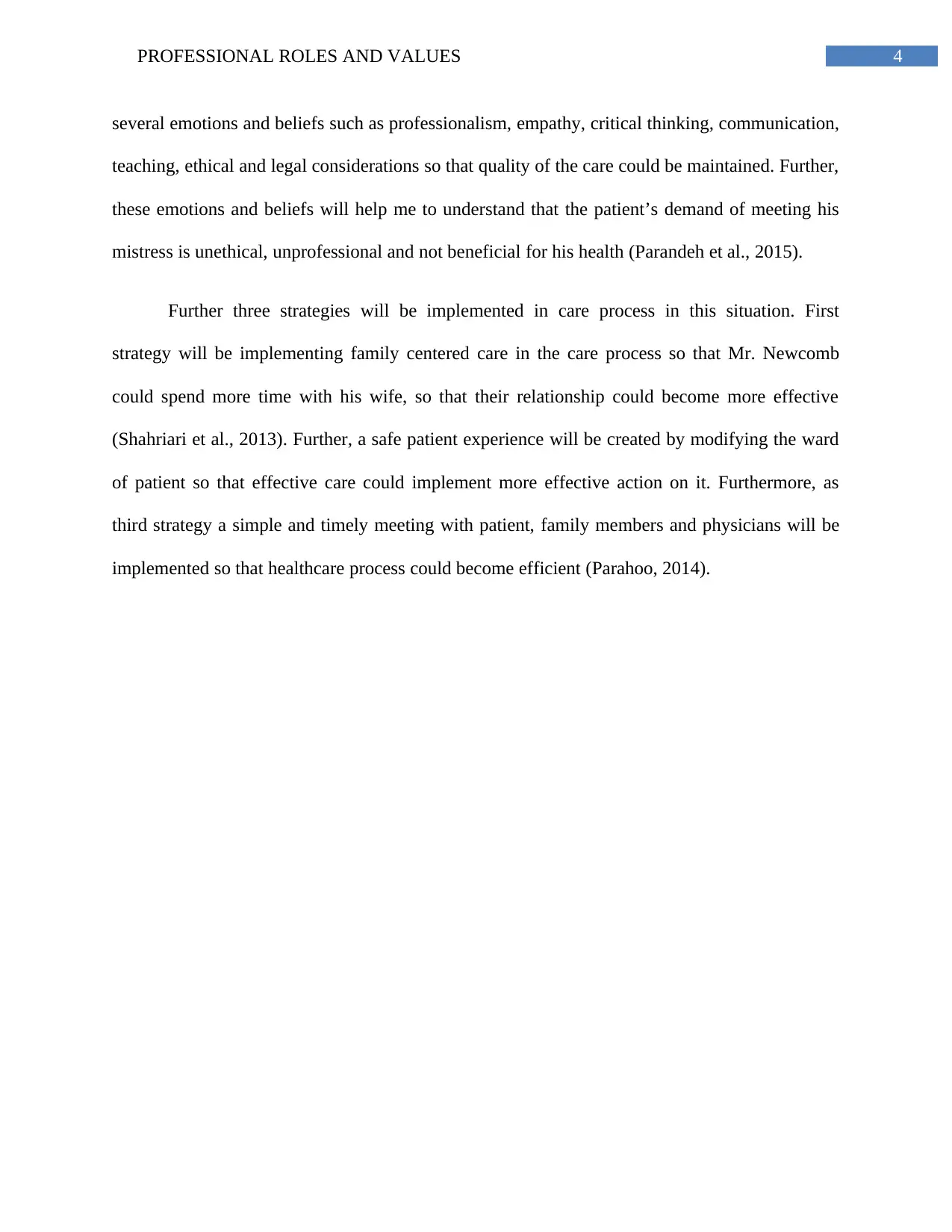
4PROFESSIONAL ROLES AND VALUES
several emotions and beliefs such as professionalism, empathy, critical thinking, communication,
teaching, ethical and legal considerations so that quality of the care could be maintained. Further,
these emotions and beliefs will help me to understand that the patient’s demand of meeting his
mistress is unethical, unprofessional and not beneficial for his health (Parandeh et al., 2015).
Further three strategies will be implemented in care process in this situation. First
strategy will be implementing family centered care in the care process so that Mr. Newcomb
could spend more time with his wife, so that their relationship could become more effective
(Shahriari et al., 2013). Further, a safe patient experience will be created by modifying the ward
of patient so that effective care could implement more effective action on it. Furthermore, as
third strategy a simple and timely meeting with patient, family members and physicians will be
implemented so that healthcare process could become efficient (Parahoo, 2014).
several emotions and beliefs such as professionalism, empathy, critical thinking, communication,
teaching, ethical and legal considerations so that quality of the care could be maintained. Further,
these emotions and beliefs will help me to understand that the patient’s demand of meeting his
mistress is unethical, unprofessional and not beneficial for his health (Parandeh et al., 2015).
Further three strategies will be implemented in care process in this situation. First
strategy will be implementing family centered care in the care process so that Mr. Newcomb
could spend more time with his wife, so that their relationship could become more effective
(Shahriari et al., 2013). Further, a safe patient experience will be created by modifying the ward
of patient so that effective care could implement more effective action on it. Furthermore, as
third strategy a simple and timely meeting with patient, family members and physicians will be
implemented so that healthcare process could become efficient (Parahoo, 2014).
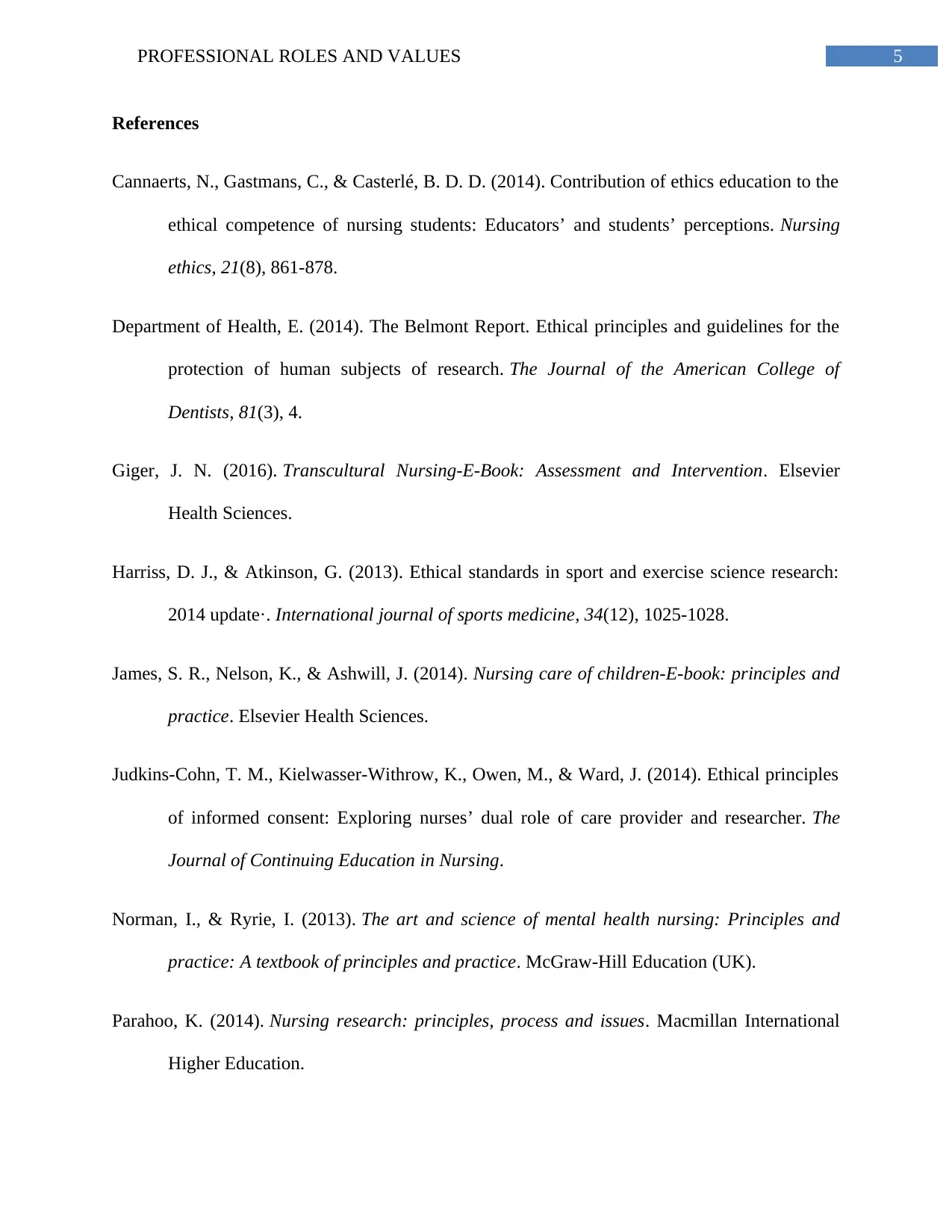
5PROFESSIONAL ROLES AND VALUES
References
Cannaerts, N., Gastmans, C., & Casterlé, B. D. D. (2014). Contribution of ethics education to the
ethical competence of nursing students: Educators’ and students’ perceptions. Nursing
ethics, 21(8), 861-878.
Department of Health, E. (2014). The Belmont Report. Ethical principles and guidelines for the
protection of human subjects of research. The Journal of the American College of
Dentists, 81(3), 4.
Giger, J. N. (2016). Transcultural Nursing-E-Book: Assessment and Intervention. Elsevier
Health Sciences.
Harriss, D. J., & Atkinson, G. (2013). Ethical standards in sport and exercise science research:
2014 update·. International journal of sports medicine, 34(12), 1025-1028.
James, S. R., Nelson, K., & Ashwill, J. (2014). Nursing care of children-E-book: principles and
practice. Elsevier Health Sciences.
Judkins-Cohn, T. M., Kielwasser-Withrow, K., Owen, M., & Ward, J. (2014). Ethical principles
of informed consent: Exploring nurses’ dual role of care provider and researcher. The
Journal of Continuing Education in Nursing.
Norman, I., & Ryrie, I. (2013). The art and science of mental health nursing: Principles and
practice: A textbook of principles and practice. McGraw-Hill Education (UK).
Parahoo, K. (2014). Nursing research: principles, process and issues. Macmillan International
Higher Education.
References
Cannaerts, N., Gastmans, C., & Casterlé, B. D. D. (2014). Contribution of ethics education to the
ethical competence of nursing students: Educators’ and students’ perceptions. Nursing
ethics, 21(8), 861-878.
Department of Health, E. (2014). The Belmont Report. Ethical principles and guidelines for the
protection of human subjects of research. The Journal of the American College of
Dentists, 81(3), 4.
Giger, J. N. (2016). Transcultural Nursing-E-Book: Assessment and Intervention. Elsevier
Health Sciences.
Harriss, D. J., & Atkinson, G. (2013). Ethical standards in sport and exercise science research:
2014 update·. International journal of sports medicine, 34(12), 1025-1028.
James, S. R., Nelson, K., & Ashwill, J. (2014). Nursing care of children-E-book: principles and
practice. Elsevier Health Sciences.
Judkins-Cohn, T. M., Kielwasser-Withrow, K., Owen, M., & Ward, J. (2014). Ethical principles
of informed consent: Exploring nurses’ dual role of care provider and researcher. The
Journal of Continuing Education in Nursing.
Norman, I., & Ryrie, I. (2013). The art and science of mental health nursing: Principles and
practice: A textbook of principles and practice. McGraw-Hill Education (UK).
Parahoo, K. (2014). Nursing research: principles, process and issues. Macmillan International
Higher Education.
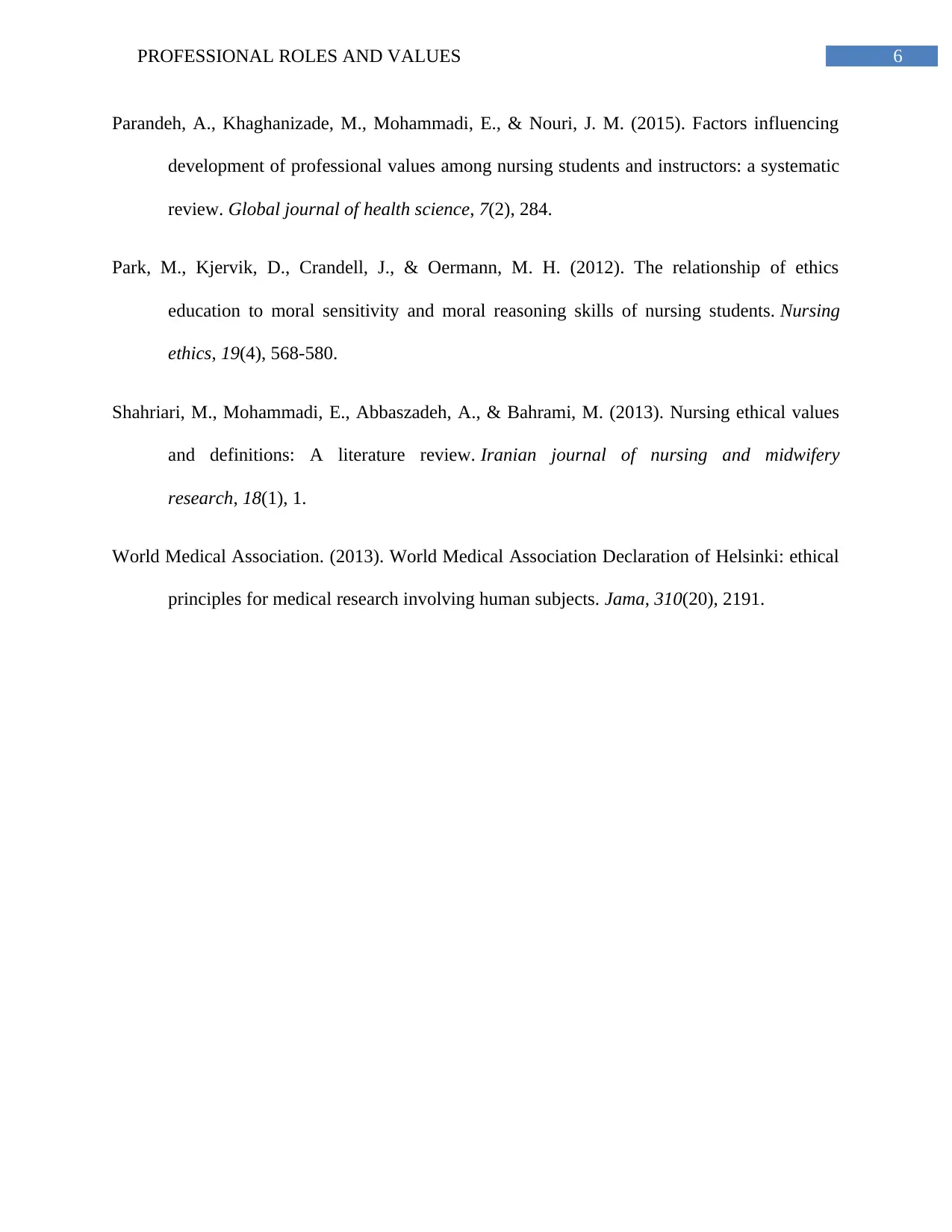
6PROFESSIONAL ROLES AND VALUES
Parandeh, A., Khaghanizade, M., Mohammadi, E., & Nouri, J. M. (2015). Factors influencing
development of professional values among nursing students and instructors: a systematic
review. Global journal of health science, 7(2), 284.
Park, M., Kjervik, D., Crandell, J., & Oermann, M. H. (2012). The relationship of ethics
education to moral sensitivity and moral reasoning skills of nursing students. Nursing
ethics, 19(4), 568-580.
Shahriari, M., Mohammadi, E., Abbaszadeh, A., & Bahrami, M. (2013). Nursing ethical values
and definitions: A literature review. Iranian journal of nursing and midwifery
research, 18(1), 1.
World Medical Association. (2013). World Medical Association Declaration of Helsinki: ethical
principles for medical research involving human subjects. Jama, 310(20), 2191.
Parandeh, A., Khaghanizade, M., Mohammadi, E., & Nouri, J. M. (2015). Factors influencing
development of professional values among nursing students and instructors: a systematic
review. Global journal of health science, 7(2), 284.
Park, M., Kjervik, D., Crandell, J., & Oermann, M. H. (2012). The relationship of ethics
education to moral sensitivity and moral reasoning skills of nursing students. Nursing
ethics, 19(4), 568-580.
Shahriari, M., Mohammadi, E., Abbaszadeh, A., & Bahrami, M. (2013). Nursing ethical values
and definitions: A literature review. Iranian journal of nursing and midwifery
research, 18(1), 1.
World Medical Association. (2013). World Medical Association Declaration of Helsinki: ethical
principles for medical research involving human subjects. Jama, 310(20), 2191.
1 out of 7
Related Documents
Your All-in-One AI-Powered Toolkit for Academic Success.
+13062052269
info@desklib.com
Available 24*7 on WhatsApp / Email
![[object Object]](/_next/static/media/star-bottom.7253800d.svg)
Unlock your academic potential
© 2024 | Zucol Services PVT LTD | All rights reserved.





